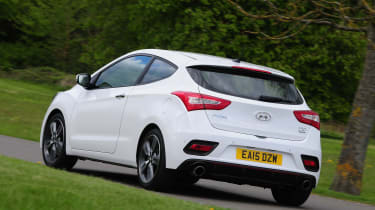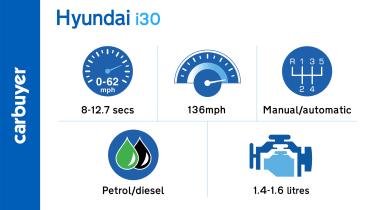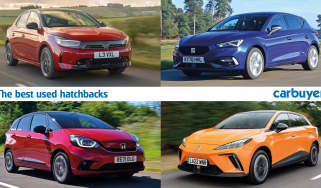Hyundai i30 hatchback (2011-2016) - Engines, drive & performance
Engines for the Hyundai i30 are more about efficiency than performance, and handling is safe rather than exciting
The second-generation Hyundai i30 is better to drive than the original model, but it still can’t hold a candle to the class leaders in terms of fun behind the wheel. Hyundai has tried to inject some involvement into proceedings with its Flex Steer system. This is offered on SE models and above, and allows you to alter the weight of the steering at the flick of a switch.
There’s a choice of Comfort, Normal and Sport settings to suit your mood or the road conditions. The trouble is, there isn’t a noticeable enough difference between each mode, and while the i30’s steering is direct, it’s not as sharp as that of class rivals such as the Ford Focus and VW Golf, so you don’t get much of a feel for what’s going on beneath you.
Ride comfort is generally good, but again, the i30 isn’t as composed as a Golf, as some potholes thump into the cabin at speed. It feels a little bit on the firm side, but without the trade-off of great cornering agility – while there’s plenty of grip, the body still leans a bit through sharp bends. So the handling isn’t as polished as in the best drivers’ cars in this class, such as the Ford Focus and Mazda3.
Hyundai i30 petrol engines
If performance is your main priority, then the Hyundai i30 probably isn’t for you. The 118bhp 1.6-litre petrol and 136bhp 1.6-litre diesel models take 10.9 and 10.2 seconds respectively to go from 0-62mph, while the diesel has the edge in terms of top speed – it can reach 122mph compared to the petrol's 119mph – it’ll cost much more to run.
All the petrol engines come with a six-speed manual gearbox as standard, but you can specify a six-speed automatic with the more powerful 118bhp engine. However, we’d suggest you save money and stick with the manual unless you really need the automatic, as it decreases fuel economy, makes the car more expensive to buy and doesn’t change gears as cleanly or as swiftly as rival automatics.
Diesel engines
Even the cleanest 108bhp 1.6-litre CRDi diesel isn’t far behind the range-topping models’ performance, although it trails rivals such as the VW Golf BlueMotion from 0-62mph and isn’t as cheap to run.
As with the petrols, the diesels have an automatic option, although there are a few differences. The automatic here is a much more pleasant-to-use seven-speed dual-clutch. Like the automatic offered with the petrols, it reduces fuel economy a bit, but it suits the diesel engine well and is a much better gearbox than the automatic for the petrols.














